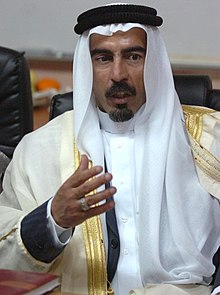No edit summary |
HanzoHattori (talk | contribs) mNo edit summary |
||
| Line 4: | Line 4: | ||
'''Anbar Salvation Council''' is a collection of tribal militias in the Al Anbar province of [[Iraq]], formed by former [[Baathist]]s and nationalists to fight [[al-Qaeda in Iraq]] and other associated terrorist groups. In Arabic the coucil is known as Sahawa Al Anbar, abbreviated SAA when referred to by the US Army. |
'''Anbar Salvation Council''' is a collection of tribal militias in the Al Anbar province of [[Iraq]], formed by former [[Baathist]]s and nationalists to fight [[al-Qaeda in Iraq]] and other associated terrorist groups. In Arabic the coucil is known as Sahawa Al Anbar, abbreviated SAA when referred to by the US Army. |
||
Fighting against the [[United States of America|Americans]] in the earlier phases of the war, elements of this group have since allied themselves with the U.S. to rid their country of foreign extremist composing mainly of [[al-Qaeda in Iraq]].<ref name="Turning Iraq's Tribes Against Al-Qaeda">[http://www.time.com/time/world/article/0,8599,1572796,00.html Turning Iraq's Tribes Against Al-Qaeda] [[TIME]], [[December]] [[26]], [[2006]]</ref> It has been reported that they have received cars, guns, and ammunition by the [[Military of Iraq|Iraqi]] and [[Military of the United States|U.S. forces]] to counter the [[Islamists]] in the [[Al-Anbar province]]. In recent months elderly sheiks and tribal leaders have turned away from the [[Islamic State of Iraq]], a radical Sunni extremist terrorist organization who specializes in car bombs and suicide attacks. On [[May 1]], [[2007]] the Anbar Salvation Council announced that it had killed [[Abu Ayyub al-Masri]], the war minister of the [[Islamic State of Iraq]] and the leader of [[al-Qaeda in Iraq]]. However, the U.S. military has refuted this claim and the status of al-Masri is still uncertain. While it is unknown if the Al Anbar Salvation council killed Abu Ayyub Al Masri, during the first few months of the coucil's existence, it is said that they killed more high level insurgents than US forces in the area. |
Fighting against the [[United States of America|Americans]] in the earlier phases of the war, elements of this group have since allied themselves with the U.S. to rid their country of foreign extremist composing mainly of [[al-Qaeda in Iraq]].<ref name="Turning Iraq's Tribes Against Al-Qaeda">[http://www.time.com/time/world/article/0,8599,1572796,00.html Turning Iraq's Tribes Against Al-Qaeda] [[TIME]], [[December]] [[26]], [[2006]]</ref> It has been reported that they have received cars, guns, and ammunition by the [[Military of Iraq|Iraqi]] and [[Military of the United States|U.S. forces]] to counter the radical [[Islamists]] in the [[Al-Anbar province]]. In recent months elderly sheiks and tribal leaders have turned away from the [[Islamic State of Iraq]], a radical Sunni extremist terrorist organization who specializes in car bombs and suicide attacks. On [[May 1]], [[2007]] the Anbar Salvation Council announced that it had killed [[Abu Ayyub al-Masri]], the war minister of the [[Islamic State of Iraq]] and the leader of [[al-Qaeda in Iraq]]. However, the U.S. military has refuted this claim and the status of al-Masri is still uncertain. While it is unknown if the Al Anbar Salvation council killed Abu Ayyub Al Masri, during the first few months of the coucil's existence, it is said that they killed more high level insurgents than US forces in the area. |
||
==Founding== |
==Founding== |
||
Revision as of 22:14, 14 July 2007
Anbar Salvation Council is a collection of tribal militias in the Al Anbar province of Iraq, formed by former Baathists and nationalists to fight al-Qaeda in Iraq and other associated terrorist groups. In Arabic the coucil is known as Sahawa Al Anbar, abbreviated SAA when referred to by the US Army.
Fighting against the Americans in the earlier phases of the war, elements of this group have since allied themselves with the U.S. to rid their country of foreign extremist composing mainly of al-Qaeda in Iraq.[1] It has been reported that they have received cars, guns, and ammunition by the Iraqi and U.S. forces to counter the radical Islamists in the Al-Anbar province. In recent months elderly sheiks and tribal leaders have turned away from the Islamic State of Iraq, a radical Sunni extremist terrorist organization who specializes in car bombs and suicide attacks. On May 1, 2007 the Anbar Salvation Council announced that it had killed Abu Ayyub al-Masri, the war minister of the Islamic State of Iraq and the leader of al-Qaeda in Iraq. However, the U.S. military has refuted this claim and the status of al-Masri is still uncertain. While it is unknown if the Al Anbar Salvation council killed Abu Ayyub Al Masri, during the first few months of the coucil's existence, it is said that they killed more high level insurgents than US forces in the area.
Founding

Sheik Abdul Sattar al-Rishawi is a Sunni leader in the Al-Anbar province leading a growing movement of Sunni tribesmen who have turned against al-Qaida-linked insurgents.[2] Al-Rishawi, whose father and three brothers were killed by al-Qaida assassins, said insurgents were "killing innocent people, anyone suspected of opposing them. They brought us nothing but destruction and we finally said, enough is enough."
Al-Rishawi founded the Anbar Salvation Council[3] in September 2006 with dozens of Sunni tribes. Many of the new newly friendly leaders are believed to have at least tacitly supported the insurgency in the past, though al-Rishawi said he never did. His movement, also known as the Anbar Awakening, now counts 41 tribes or sub-tribes from Anbar, though al-Rishawi acknowledges that some groups in the province have yet to join. It's unclear how many that is, or much support the movement really has.[2]
Membership and organization
- Sheikh Hamid al-Hais is the current head. [1]
External links
References
- ^ Turning Iraq's Tribes Against Al-Qaeda TIME, December 26, 2006
- ^ a b Sunni Sheiks Join Fight Vs. Insurgency Washtington Post, March 25, 2007
- ^ Meet Iraq's Most Important Man The New York Sun, April 3, 2007